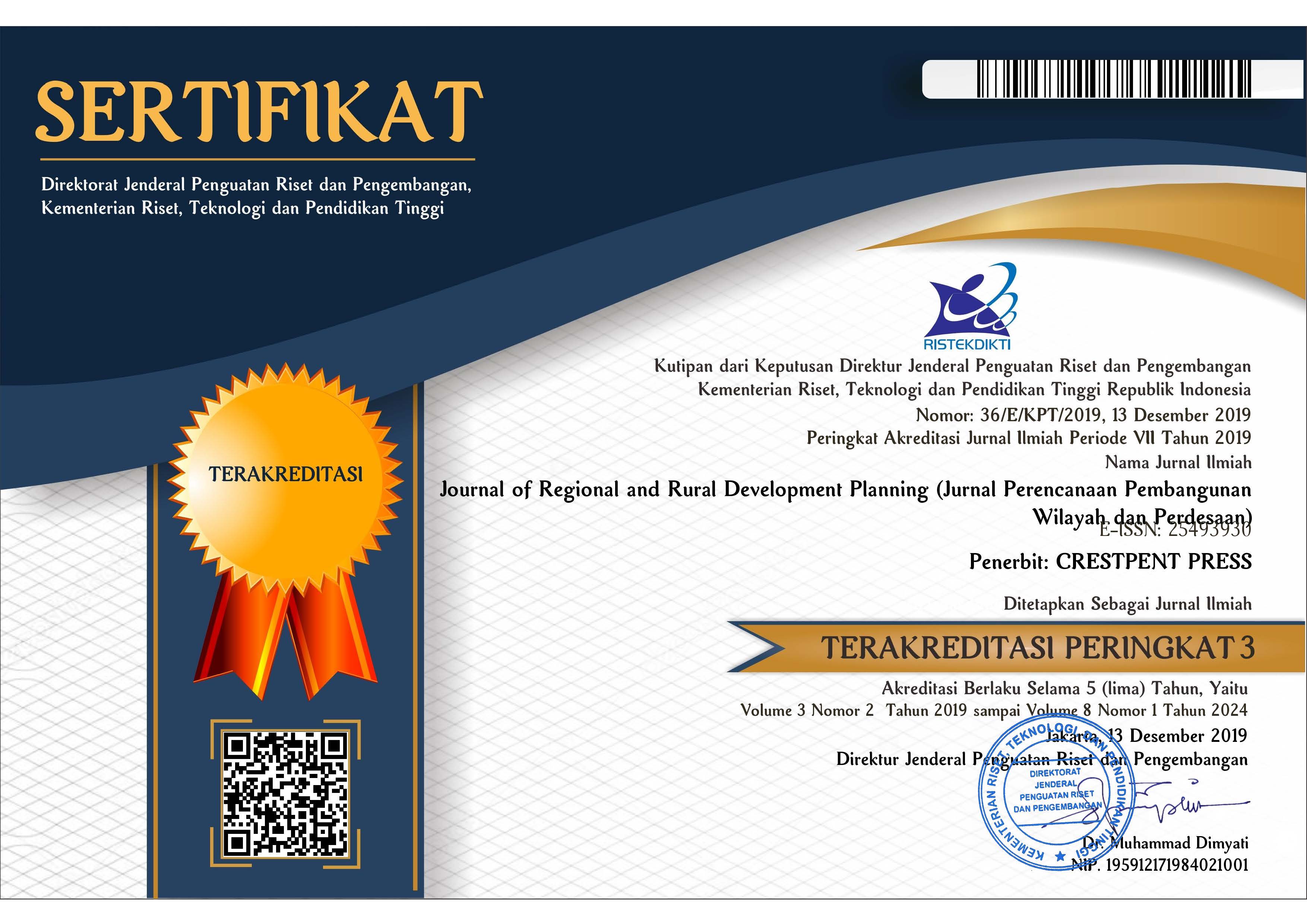Analisis Strategi Kesuksesan Kampung Digital Krandegan dalam Mendukung Program Smart Village
Analysis of the Success Strategy of Krandegan Digital Village in Supporting the Smart Village Program
Abstract
Krandegan Digital Village is an example of a smart village, which proved to be able to rise from desolate. The village started from a poor status and turned into the first independent village in Purworejo Regency through optimizing digitalization, especially in the fields of economy and efficiency. Krandegan as a pioneer of the digital-based village in Purworejo has been successful in many proud achievements. However, Krandegan's success cannot be separated from various obstacles faced previously. This study aims to explore what are the obstacles and the key to success of Krandegan Digital Village in supporting the Smart Village program. This research used a qualitative clustering method through a network of ideas using the Wordle program. The result of this research found that Krandegan Village implementation constraints have several important points, namely mindset, needs, interests, application development, socialization, and digital literacy. Meanwhile, the success of the Krandegan Digital Village is influenced by several important factors, including transparency, institutions, human resources, leadership, and thinking strategies. This study provides important information about the transformation of an underdeveloped village into a smart village.
References
Alhari, M. I., Febriyani, W., Jonson, W. T., & Fajrillah, A. A. N. (2021). Perancangan Smart Village Platform Aplikasi Edukatif untuk Monitoring Desa. Jurnal Ilmiah Teknologi Informasi Asia, 15(1), 51–60.
Alserhan, H., & Shbail, M. (2020). The Role of Organizational Commitment in The Relationship Between Human Resource Management Practices and Competitive Advantage in Jordanian Private Universities. Management Science Letters, 10(16), 3757–3766.
Andari, R. N & Ella, S. (2019). Pengembangan Model Smart Rural untuk Pembangunan Kawasan Perdesaan di Indonesia. Jurnal Borneo Administrator, 15(1), 41–58.
Anwar, G., & Abdullah, N. N. (2021). The Impact of Human Resource Management Practice On Organizational Performance. International journal of Engineering, Business and Management (IJEBM), 5(1), 35–47.
Bappenas. (2002). Public Good Governance: Sebuah Paparan Singkat. Jakarta: Bappenas RI.
BPS. (2018). Statistik Hasil Pendataan Potensi Desa (Podes). Jakarta: Badan Pusat Statistik.
Chatterjee, S., & Kar, A. K. (2018). Effects of Successful Adoption of Information Technology enabled Services in Proposed Smart Cities of India: From User Experience Perspective. Journal of Science and Technology Policy Management, 9(2), 189–209.
Gunawan, A. W. (2007). The Secret of Mindset. Jakarta: Gramedia Pustaka Utama, 273.
Hasugian, P. M. (2020). Village Status Grouping Analysis Using Agglomerative Hierarchical Clustering (AHC). Jurnal Mantik, 4(1), 950–954.
Herdiana, D. (2019). Pengembangan Konsep Smart Village Bherdianaagi Desa-Desa di Indonesia (Developing the Smart Village Concept for Indonesian Villages). Jurnal Ilmu Pengetahuan & Teknologi Informasi, 21(1), 1–16.
Homans, G. C. (1950). The Human Group. New York: Harcourt, Brace and World.
Jusniaty., Asriadi, A, R., Jamaluddin, A., Abdullahi, A.B. (2019). Tata Kelola Pemerintahan Desa dalam Mewujudkan Smart Village di Desa Tongke-Tongke Kabupaten Sinjani. Prosiding KN-9 APPPTMA, 369–378. Malang.
Kholis, A., Husrizalsyah, D., & Pramana, A. (2020). Analisis Model Delone and Mclean Pada Penerapan Sistem Informasi Akuntansi Pemerintah Kota Medan. Jurnal Ilmiah Manajemen, Ekonomi, & Akuntansi, 4(2), 116–128.
Kilani, Y. M. M. (2020). The Moderating Role of Innovation Balance Between Adoption and Actual Use of E-Government Services: An Extension of Delone and Mclean Information Success Model. International Journal of Business Innovation and Research, Inderscience Enterprises Ltd, 26(3), 273–295.
Kurnianingsih, I., Yugaswara, H., Suhaeri, S., Wardiyono, W., & Rosini, R. (2020). PKM Smart Village Melalui Pengelolaan Perpustakaan Desa Rintisan Berbasis Teknologi Informasi di Desa Bantarsari Bogor. Jurnal Abdinus: Jurnal Pengabdian Nusantara, 4(1), 63–74.
Maharani, E. N., & Kencono, D. S. (2021). Penerapan Smart Governance dalam Smart Village di Kalurahan Dlingo Kabupaten Bantul. Jurnal Ilmu Sosial dan Ilmu Politik Universitas Jambi, 5(2), 25–38.
Maslow, A. H. (1943). A Theory of Human Motivation. Psychological Review, 50(4), 370–396.
Megawati., & Maftukhah., N.A. (2017). Analisis Kesuksesan Penerapan Sistem Informasi Administrasi Kependudukan Menggunakan Model Delone and Mclean (Studi Kasus: Dinas Kependudukan dan Pencatatan Sipil Kota Pekanbaru). Jurnal Ilmiah Rekayasa Dan Manajemen Sistem Informasi, 3(2), 84–86
Metcalfe, M. (2007). Problem Conceptualisation using Idea Networks. Systemic Practice and Action Research, 20(2), 141-150
Metcalfe, M. (2014). Strategic Concepts Book of Readings. University of South Australia: Adelaide.
Munir, D. (2017). Smart Village: Desa Maju, Desa Bahagia. APEKSI: Asosiasi Pemerintah Kota Seluruh Indonesia.
Nurjayadi, N, T., Herwin., & Andesa, K. (2020). Peningkatan Pelayanan Terhadap Masyarakat melalui Kegiatan Smart Village pada Desa Rimba Makmur Kabupaten Kampar. Dinamisia: Jurnal Pengabdian Kepada Masyarakat, 4(1), 140–151.
Peterson, R. S., & Behfar, K. J. (2003). The Dynamic Relationship Between Performance Feedback, Trust, and Conflict in Groups: A Longitudinal Study. Organizational Behavior and Human Decision Processes, 92(1-2), 102–112.
Prakoso, B. S. (2018). Kepuasan Layanan Online E-Government di Kementerian Agama Indonesia. Thesis. Institut Teknologi Sepuluh Nopember.
Rahmatika, U., & Fajar, M. A. (2019). Faktor-Faktor Yang Mempengaruhi Minat Penggunaan Electronic Money: Integrasi Model Tam–Tpb Dengan Perceived Risk. Nominal: Barometer Riset Akuntansi Dan Manajemen, 8(2), 274–284.
Ramesh, B. (2018). Concept of Smart Village and it’s Impact on Rurbanization. International Journal of Trend in Scientific Research and Development, 2(3), 1948–1950.
Ridhawati, E., Fitrian, Y., Sari, D. N., P, P., & Pratama, R. (2019). Penerapan E-government pada Pekon Sukamulya (Studi kasus: Pekon Sukamulya Pringsewu. Jurnal Cendikia, 17(1 April), 246–250.
Rozikin, M., Hesty, Wa., & Sulikah. (2020). Kolaborasi dan E-literacy Kunci Keberhasilan Pemerintah Daerah. Jurnal Borneo Administrator, 16(1), 61–80.
Sabani, A., Deng, H., & Thai, V. (2018). A Conceptual Framework for The Adoption of E-Government In Indonesia. Proceedings of the 29th Australasian Conference on Information Systems (ACIS), 1–12. Sydney.
Saputro, H. (2016). Analisa Kesuksesan E-Government Menggunakan Success Model’s Delone and Mclean (Studi Kasus: Pemerintah Kota Pekalongan). Dissertation Universitas Atma Jaya Yogyakarta
Sirsat, S. S., & Sirsat, M. S. (2016). A validation of the DeLone and McLean Model on the Educational Information System of the Maharashtra State (India). International Journal of Education and Learning Systems, 1(2016), 10–18.
Sudarto, Y. (2006). E-Government dan Reformasi Birokrasi Menuju Pemerintahan yang Baik. Prosiding Konferensi Nasional Teknologi Informasi & Komunikasi untuk Indonesia, 44–47. Bandung.
Suherdi, D. (2021). Peran Literasi Digital di Masa Pandemik. Deli Serdang: Cattleya Darmaya Fortuna.
Susandi, D., Sujadi, H., & Rohmanudin, W. (2020). Pemanfaatan Internet Of Things dalam Sistem Peringatan Dini pada Smart Village. Jurnal Nasional Komputasi dan Teknologi Informasi, 3(1), 29–37.
Sutaryo. (2004). Dasar-dasar Sosialisasi. Jakarta: Rajawali Press, 156.
Utmary, N., & Agustin, H. (2020). Evaluasi Keberhasilan Sistem Keuangan Desa Menggunakan Delone & Mclean Is Success Model. Jurnal Eksplorasi Akuntansi, 2(3), 3216–3235.
Utomo, C. E. W., & Hariadi, M. (2016). Strategi Pembangunan Smart City dan Tantangannya bagi Masyarakat Kota. Jurnal Strategi dan Bisnis, 4(2), 159–176.
Copyright (c) 2022 Journal of Regional and Rural Development Planning (Jurnal Perencanaan Pembangunan Wilayah dan Perdesaan)

This work is licensed under a Creative Commons Attribution-ShareAlike 4.0 International License.




.png)














